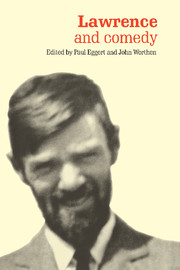Book contents
- Frontmatter
- Contents
- Note on contributors
- Acknowledgements
- Cue-titles
- Introduction
- 1 Drama and mimicry in Lawrence
- 2 Mischief or merriment, amazement and amusement – and malice: Women in Love
- 3 Comedy and hysteria in Aaron's Rod
- 4 D. H. Lawrence and his ‘gentle reader’: The furious comedy of Mr Noon
- 5 ‘Homunculus stirs’: Masculinity and the mock-heroic in Birds, Beasts and Flowers
- 6 Comedy and provisionality: Lawrence's address to his audience and material in his Australian novels
- 7 Lawrence's satiric style: Language and voice in St. Mawr
- 8 Humour in the letters of D. H. Lawrence
- 9 Lawrence to Larkin: A changed perspective
- Index
2 - Mischief or merriment, amazement and amusement – and malice: Women in Love
Published online by Cambridge University Press: 01 March 2010
- Frontmatter
- Contents
- Note on contributors
- Acknowledgements
- Cue-titles
- Introduction
- 1 Drama and mimicry in Lawrence
- 2 Mischief or merriment, amazement and amusement – and malice: Women in Love
- 3 Comedy and hysteria in Aaron's Rod
- 4 D. H. Lawrence and his ‘gentle reader’: The furious comedy of Mr Noon
- 5 ‘Homunculus stirs’: Masculinity and the mock-heroic in Birds, Beasts and Flowers
- 6 Comedy and provisionality: Lawrence's address to his audience and material in his Australian novels
- 7 Lawrence's satiric style: Language and voice in St. Mawr
- 8 Humour in the letters of D. H. Lawrence
- 9 Lawrence to Larkin: A changed perspective
- Index
Summary
This essay was a resounding success before it ever got written, in that the very idea of it sent my friends off into peals of laughter. You must have drawn the short straw, they said. Isn't Women in Lovethe one Lawrence thought of calling Dies Irae? How about calling your piece Day of Judgement: Its Lighter Moments?. This made me recall uncomfortably Lawrence's mockery of a poem in a book he once reviewed – a poem which assured us that God ‘had his pleasant side’. And I was also aware of how the novel's merriment constantly shades off into mischief and malice.
‘Mischief or Merriment’ – I take this phrase from the letter Lawrence wrote in 1925 to the Italian critic Carlo Linati, who had complained that Lawrence's fiction was troppo frenetico! – too frantic or frenzied; that it lacked artistic detachment. But detachment, replies Lawrence, is just what he never aimed at. For him, ‘An author should be in among the crowd, kicking their shins or cheering them on to some mischief or merriment’ (v. 201). And the letter itself is full of mischievous merriment: ‘I can't help laughing, your article seems such a breathless series of explosions. Do I really seem like that? – all you say?’ (v. 200). So that in another alliterating but paradoxical phrase, Lawrence reacts to the critic with amazement and amusement.
That last phrase is actually from Women in Love and I'll turn later to its context. But what prompted my essay was not a letter, or a novel, but a photograph.
- Type
- Chapter
- Information
- Lawrence and Comedy , pp. 45 - 69Publisher: Cambridge University PressPrint publication year: 1996



